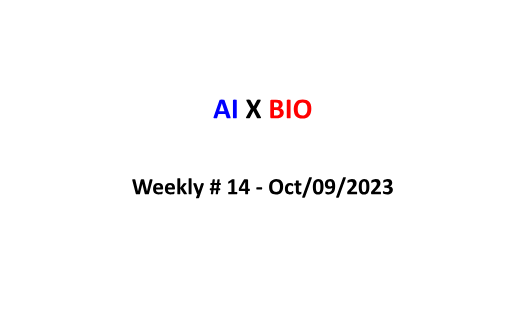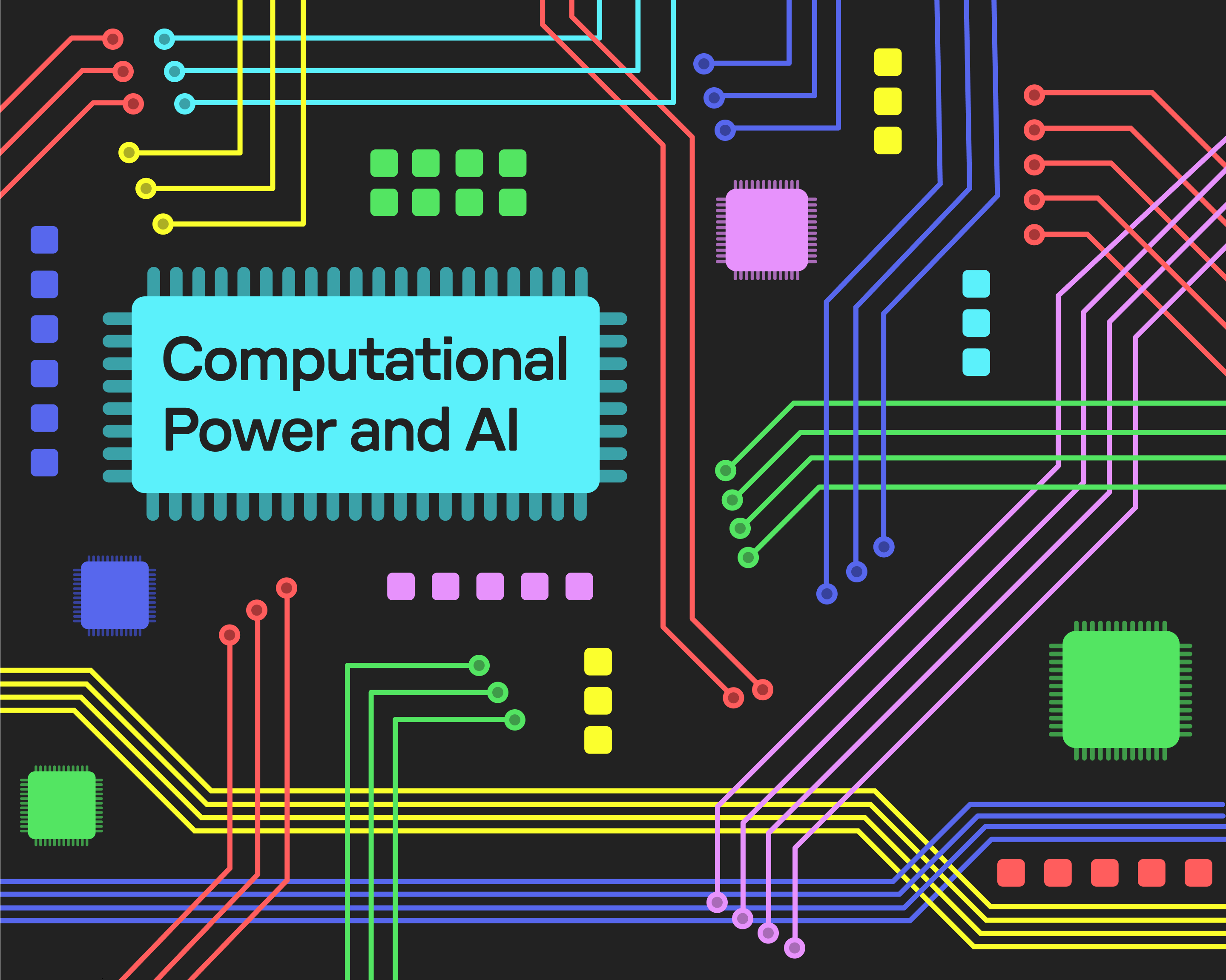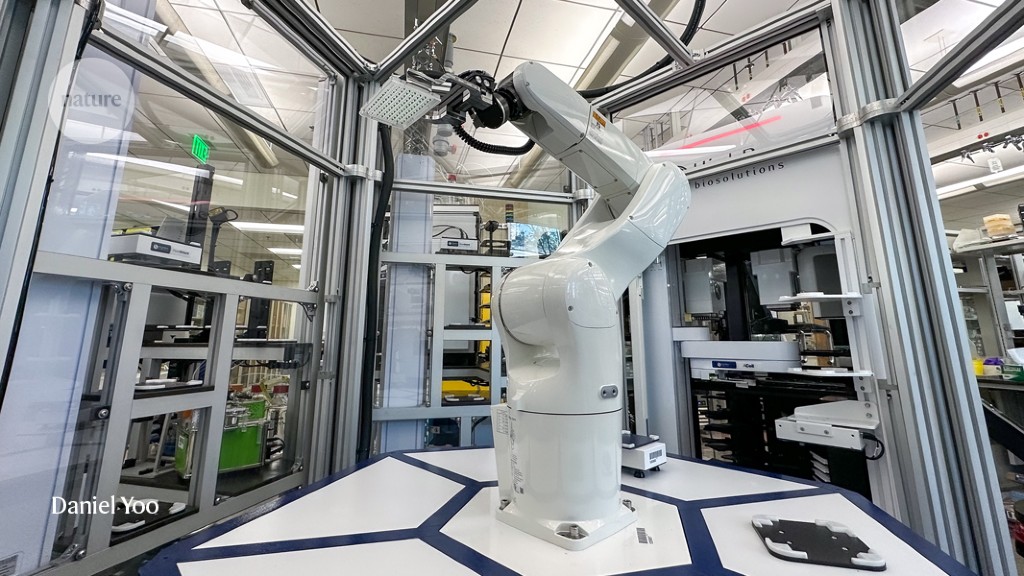- AIXBIO
- Posts
- AIXBIO Weekly #14 - Oct/09/2023
AIXBIO Weekly #14 - Oct/09/2023

Regulation & Ethics
U.S. Government & Top VC Firms Collaborate for Responsible AI Development in Startups
The U.S. government is collaborating with leading venture capital firms in a voluntary agreement to promote responsible AI development in early-stage startups. This initiative, known as the Responsible AI Initiative, is spearheaded by General Catalyst. The plan is a joint venture between the Commerce Department and the Responsible Innovation Lab (RIL), a consortium of tech industry stakeholders advocating for safe innovation. Investors participating in this initiative will commit to funding AI startups under a set of voluntary safeguards. These safeguards are designed to ensure the responsible use of AI technology, with signatories agreeing to disclose safety evaluations, undergo regular AI platform audits, and commit to implementing any necessary improvements. The focus on startups is intentional to ensure that AI regulations don't favor only the big tech firms. The RIL, founded by General Catalyst’s Taneja and two former Stripe executives, has garnered support from various other signatories, including Mayfield, Bain Capital Ventures, and Lux Capital. The overarching goal is to ensure that startups have clear guidelines for responsible AI practices, especially since they often lack the resources to consider the long-term implications of their technologies.
EU Commission Highlights Four Critical Tech Areas for Risk Assessment
The European Commission has adopted a recommendation emphasizing the need for risk assessments in four pivotal technology areas: advanced semiconductors, artificial intelligence, quantum technologies, and biotechnologies. This move is a part of the European Economic Security Strategy, aiming to bolster the EU's economic security.
The recommendation focuses on technology risk and potential technology leakage. The Commission has identified ten critical technology areas based on specific criteria, including the transformative nature of the technology, the risk of civil and military fusion, and the potential misuse in violation of human rights. Out of these ten areas, four are deemed to present immediate risks related to technology security. The Commission seeks to collaborate with Member States to conduct collective risk assessments of these areas by the end of the year. The outcomes of these assessments will guide further discussions on necessary measures to ensure the EU's technological edge and address dependencies. The Commission's initiative is a response to the evolving geopolitical landscape, emphasizing the EU's intent to be a significant player in the global tech arena.
A Glimpse into the EU's AI Regulatory Journey: A Letter to the Future AI Office
EU's upcoming AI Office will guide AI Act's implementation, focusing on harmonized standards & risk-based regulations. Challenges lie in evolving tech & legal intersections.
The EU is on the brink of enacting the AI Act, marking the beginning of a comprehensive journey towards its successful implementation. The soon-to-be-established AI Office is anticipated to play a pivotal role in this process, especially in advising and coordinating decision-makers. One of the AI Office's significant tasks will be to manage the uncertainties surrounding the AI Act's implementation. The Act categorizes AI uses into four risk levels and mandates open-ended risk assessments. To reduce uncertainties, harmonized standards are being developed by European committees like CEN and CENELEC. These standards will translate the AI Act's requirements into clear expectations for AI system providers and deployers. However, the dynamic nature of AI technology and its applications means that the AI Act will need regular updates to stay relevant. Furthermore, the enforcement of the AI Act will inevitably be determined in courts, both at the national and EU levels. The AI Office is expected to monitor these legal proceedings, providing insights that will shape the EU's AI regulatory ecosystem.
One Year Since White House introduces AI Bill of Rights
Today we celebrate the one-year anniversary of the Biden-Harris Administration’s landmark AI Bill of Rights.
Since then, we’ve taken action to ensure we are building a fairer, safer, and more just tech future.
— Vice President Kamala Harris (@VP)
10:49 PM • Oct 4, 2023
Aiming for transparent AI governance & citizen protection. The AI Bill of Rights proposes guidance for government agencies and is a call to action for tech companies, researchers, and civil society. The Bill emphasizes protection from unsafe AI systems, non-discriminatory algorithms, and citizens' agency over their data. The document is nonbinding and does not constitute US government policy. Some critics believe the document lacks enforcement details. The AI Bill of Rights might pave the way for future legislation on AI.
Health AI: A Global Initiative to Guide Responsible AI in Healthcare
Health AI, a global agency, launches to guide responsible AI in healthcare. Collaborating with WHO, ITU & WIPO, it aims to set global AI standards & bridge tech gaps between nations. AI's rapid growth calls for coherent regulations
The article from Health Policy Watch highlights the launch of Health AI, the Global Agency for Responsible AI in Health. Emphasizes that AI has the potential to revolutionize healthcare. Health AI, which began as I-DAIR, has now evolved with a renewed strategy and has partnered with WHO. Its primary goal is to support AI research and its implementation by developing coherent regulatory policies on a global scale. The agency recognizes the swift advancements in AI and the challenges it poses to regulatory bodies. With AI technologies already making headway in healthcare, especially in imaging diagnostics, there's a pressing need for standardized regulations. Health AI is committed to bridging the technological divide between high and low-income nations, ensuring that AI remains a tool for humanity's benefit. The agency envisions co-creating global AI standards with WHO and other international bodies, aiming for a future where AI-driven tools are trusted and widely accepted in health systems worldwide.
Discovery
Cambridge's Breakthrough AI-Driven Method Unveils New Drug Discovery Targets
Cambridge & Insilico Medicine unveil AI-driven method to identify drug targets linked to protein phase separation. This could aid Alzheimer's research & more
Researchers from the University of Cambridge, in collaboration with Insilico Medicine, have pioneered an AI-driven technique to identify therapeutic targets for diseases linked to protein phase separation. This cellular phenomenon, essential for various biological functions, can lead to diseases when dysregulated. The team's approach combined Insilico’s PandaOmics, an AI-driven therapeutic target discovery tool, with the FuzDrop method, which gauges a protein's propensity for spontaneous phase separation. Through this, they conducted an extensive study on human sample data, assessing the impact of protein phase separation on various pathological processes. The results highlighted potential therapeutic targets for diseases associated with protein phase separation. Furthermore, the team validated the behaviors of three predicted Alzheimer’s disease targets, offering evidence for their potential as therapeutic targets.
Insilico's Novel Approach with Microsoft's BioGPT Targets Aging and Disease
Insilico Medicine leverages Microsoft's BioGPT, identifying 9 potential targets against aging & major diseases. Two genes, previously unlinked to aging, were discovered. This AI-driven approach hints at the future of drug discovery.
Insilico Medicine, has harnessed the capabilities of Microsoft's BioGPT to pinpoint potential therapeutic targets against aging and age-related diseases. This innovative approach, rooted in the power of large language models (LLMs) like GPT-4, has identified 9 potential dual-purpose targets. Remarkably, two of these genes had not been previously associated with the aging process. This breakthrough underscores the untapped potential of Transformer models in predicting novel targets in the biomedical domain. BioGPT, a product of collaboration between Microsoft Research and Peking University in China, stands out due to its extensive training on millions of biomedical research articles. To amplify the efficacy of BioGPT, Insilico's researchers utilized a vast dataset of 900,000 grant proposals from the National Institutes of Health. The outcome was the identification of 9 potential targets, with 5 being earmarked as dual-purpose against aging and a range of age-related diseases, including Alzheimer’s.
AI's Growing Role in Global Health: A Comprehensive Review
AI's potential in global health is explored in a systematic review by PLOS Medicine. 82 articles analyzed, with 68% from high-income countries. Diagnosis (44%) & radiology (23%) are top uses. More research needed in low-income regions.
Investment & Partnership
Iambic Therapeutics Secures $100M in Series B Funding to Propel AI-Driven Drug Discovery
Iambic Therapeutics, formerly known as Entos, recently announced the successful closure of a $100 million Series B financing round that was oversubscribed. This significant funding event was co-led by Ascenta Capital and Abingworth, with notable participation from tech giant NVIDIA, Illumina Ventures, Gradiant Corporation, and several other investors. Iambic's AI-Driven drug-discovery platform stands out for its ability to identify potential first-in-class and best-in-class development candidates at a pace that surpasses industry standards.
With the infusion of funds from the Series B round, Iambic has ambitious plans. The company intends to push multiple AI-discovered candidates into clinical development, expand its existing pipeline, and continue innovation in AI and automation technologies tailored for drug discovery. A collaboration with NVIDIA is also on the cards, with Iambic planning to leverage NVIDIA's advanced computing solutions to accelerate its discovery processes.
AI-Powered Startups Pioneering the Future of Drug Discovery
Numerous startups are harnessing the power of AI to enhance the drug discovery process, aiming to develop drugs for conditions that have been historically challenging to address. The potential economic impact of this shift is substantial, with projections indicating that the global market for AI in drug discovery, currently valued at around $11 billion, could soar to $188 billion by 2030.
Several startups are at the forefront of this revolution. Molecule One, based in Warsaw, is leveraging machine learning to predict the best ways to synthesize valuable molecules, a pivotal step in drug creation. UK-based CellVoyant is employing AI to develop stem cell-based therapies for chronic diseases. CHARM Therapeutics is utilizing advanced computing and machine learning to develop novel treatments for hard-to-drug cancers and diseases. Other notable startups include Isomorphic Labs, Ignota Labs, Turing Biosystems, Cradle, Aqemia, Chemify, Multiomic Health, and Iktos, each bringing unique AI-driven solutions to the drug discovery landscape.
AI & Environment
Microsoft's AI Training Raises Concerns Amid Iowa's Drought
Microsoft's Iowa data centers used vast water amounts for OpenAI's ChatGPT-4 training amid a 3-yr drought, raising concerns. Critics argue against non-essential water use. Microsoft aims for environmental milestones by 2030
Microsoft's data centers in West Des Moines, Iowa, have come under scrutiny for their significant water consumption, especially during the training of OpenAI's ChatGPT-4. This has been particularly concerning as Iowa has been experiencing a drought for over three years. The situation highlights the environmental challenges posed by the increasing demand for AI and the resources required for its training. The broader concern is the environmental impact of such practices, especially in the face of climate change. Microsoft's water consumption globally surged by 34% last year, with AI training being a likely contributor. This trend is not isolated to Microsoft; other tech giants like Google have also seen a spike in water usage. The increasing demand for water by data centers, combined with the effects of climate change, poses challenges for local water systems. Despite the criticism, Microsoft has stated its commitment to being environmentally responsible, with goals to be carbon negative, water positive, and achieve zero waste by 2030. Local water utilities have also acknowledged the challenges and are looking at ways to ensure sustainable water usage in the future.
AI Now Institute: Unveiling the Social & Environmental Costs of AI's Growth
AI Now Institute at NYU delves into AI's social implications & its environmental costs. Emphasizes transparency & oversight, addressing AI's carbon footprint & power concentration.
& Opinions
HMS researchers launch platform to enhance AI in drug discovery. Aims to bridge tech & biomedical fields, offering curated datasets & algorithms. AI's potential in drug discovery explored
AI can enhance drug discovery by improving protein drug predictions. Incorporating AI & generative biology can drastically improve drug development efficiency. Collaboration is key for data sharing & predictive success.
Please Share, Subscribe, Comment, & help us grow
Thanks !
AIXBIO





.jpg)



